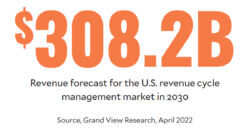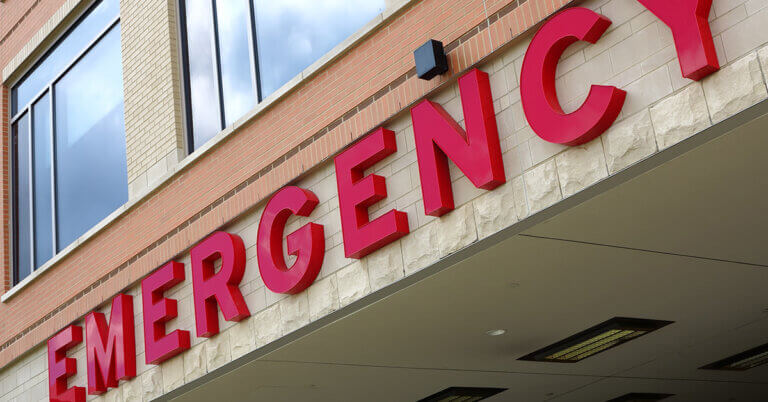November 3, 2022

Rewiring Healthcare’s Smartest Professionals (Hint: It’s Not Physicians)
I won’t keep you in suspense. Healthcare’s smartest professionals are the tens of thousands of individuals who populate its revenue cycle operations.
Revenue cycle professionals determine how much payers fork out and how much providers receive for healthcare treatments. They constitute the beating heart of the nation’s transactional healthcare system. Their ingenuity knows no bounds. Their smarts, however, don’t always translate into what’s best for patients.
Healthcare’s Financial Engine
Revenue cycle management (RCM) is a massive and growing industry. A recent market analysis by Grand View Research pegs the outsourced RCM market in the U.S. at $140.4 billion in 2022, with 10.3% forecasted annual growth through 2030. [1] By comparison, Ibis World estimates the 2022 U.S. car and automobile market to be $100.9 billion, growing at just 2.6% this year. In today’s America, processing medical claims is far more lucrative than manufacturing cars and trucks.
Despite rhetoric to the contrary, optimizing revenue is the organizing principle for healthcare companies across all industry segments. It’s not mission or value or customer service or well-being. Where and whenever possible, incumbents exploit complex payment formularies negotiated or arranged among payers, providers and manufacturers to maximize profits.
Documenting transactional activity is RCM’s currency. Do RCM well and money flows irrespective of treatment outcomes, costs or patient experience.
The Dog-Eat-Dog RCM Marketplace
Markets are always smarter than governmental actors. The RCM market is no exception. When CMS creates new payment formularies, RCM’s relentless professionals don’t sleep until they determine how to crack the new codes and optimize payment revenues.
My favorite example was Medicare’s decision to address severe malnutrition among the elderly with new payment codes. RCM experts went to work. Suddenly, claims of severe malnutrition associated with major complications or comorbidities flooded CMS. HHS’s Office of Inspector General (OIG) later concluded that hospitals had overbilled CMS by $1 billion. [2]
The battle between commercial payers and providers is even more cutthroat. Each employs armies of RCM professionals to “negotiate” treatment claims. Providers employ tactics to minimize denials and optimize their revenue intake. Payers resist by challenging claims, creating delays and demanding more data. Their war never ends.
The Story of Ingenuity and Harm
The ingenuity required to design and execute RCM strategies is extraordinary, even as these strategies ultimately harm patients and communities. In September, the New York Times published an investigative report on how Bon Secours Mercy Health (BSM Health) manipulated the 340B program to generate enormous profits through an impoverished hospital in Richmond, Virginia. [3]
BSM Health has owned Richmond Community Hospital (RCH) since 1995. The hospital is so strapped financially that it no longer has an ICU. Patients needing intensive-care services must now go elsewhere. RCH also lacks a maternity ward, basic specialty care and even common medical instruments. As the Times reports, these service deficiencies can cause patient harm and even lead to preventable deaths.
The federal government’s $340B program enables clinics within impoverished neighborhoods to buy costly drugs at a steep discount, bill commercial insurers for the drug’s full price and keep the difference. The program expects participants to invest generated proceeds into facilities and care services that benefit low-income communities.
Exploiting a loophole in the program, BSM Health launched nine clinics affiliated with RCH in adjacent, affluent communities. This approach maximized BSM’s revenue intake through the 340B program and made the hospital the most profitable one ($110 million profit and 45% profit margin in FY20) within the health system.
BSM isn’t alone in taking advantage of the 340B program for financial gain. Nationwide, 2,500 nonprofit and governmental hospitals participated in the program during 2019. Unlike single-site facilities, health systems have the ability to exploit program provisions for broader corporate gain. Many, like BSM Health, choose to do so.
Patients Beware
 Even with commercial insurance, patients are often an afterthought in the titanic battles between payers and providers. Actor and author Annabelle Gurwitch’s chronicles of her experiences with Stage 4 lung cancer for The Washington Post shine a light on this truth.
Even with commercial insurance, patients are often an afterthought in the titanic battles between payers and providers. Actor and author Annabelle Gurwitch’s chronicles of her experiences with Stage 4 lung cancer for The Washington Post shine a light on this truth.
In a recent commentary, she relates her Hobbesian struggle with AstraZeneca, Express Scripts, Accredo (specialty pharma company), SavOn (a specialty pharma subcontractor to Accredo) and secretive copayment accumulators to manage payment for her expensive biomarker-directed therapy (Tagrisso). [4] While Tagrisso costs $14,000 per month, AstraZeneca can offset some of that cost through a copay assistance program.
Gurwitch describes a cascade of unexpected bills, automatic bank withdrawals, plan changes, coverage errors and misinformation. If this sounds complicated, it was and is. For example, copay accumulators can deny coverage for therapies, including Tagrisso, that they deem nonessential. A loophole in the Affordable Care Act then allows them to reset members’ pharmacy benefit deductibles and out-of-pocket maximums to amounts of their choosing.
Gurwitch has spent days of her cancer-shortened life trying to understand her payment responsibilities, correct errors and manage the cadre of companies “assisting” her. She describes herself as “being at war with an insurance system that acts like an extortion scheme.”
A Thought Experiment
RCM consumes enormous resources to optimize payer, provider and manufacturer revenues. Its gains, however, are zero-sum. As participants shift money between themselves, productivity declines, costs rise and patient experience suffers. High costs lead many consumers to forgo or minimize necessary care. There has to be a better way.
British playwright George Bernard Shaw once remarked, “You see things; you say, ‘Why?’ But I dream things that never were; and I say ‘Why not?’”
Senator Robert Kennedy liked this quote so much that he used a similar quotation as the theme for his 1968 presidential campaign.
Imagine a healthcare system that employed its best minds to generate high-value care. I don’t have to imagine because I’ve seen one in operation. Narayana Health (NH) in Bangaluru, India, is a massive system with almost unlimited demand for surgical procedures. Most patients lack health insurance and pay cash. Consequently, lower surgery prices lead to greater care access.
NH operates seven days a week. Surgeries begin at 7 a.m. and continue past midnight. NH approaches surgery like manufacturing. Teams of operating engineers scour data to discover ways to extend equipment life, find lower-cost supplies and make operations more efficient.
The results of this cost-conscious approach are remarkable. NH publishes their prices, conducts surgeries at a fraction of the U.S. cost and achieves outcomes equivalent to the Mayo Clinic’s. [5] Founder Devi Shetty describes NH as the Walmart of healthcare. Creating value is their daily quest.
When HFMA names the cost-effectiveness of health as its just cause, I envision Narayana-like facilities operating throughout the United States, where every American receives appropriate and cost-effective care. Why not?
Sources
- Grand View Research, U.S. Revenue cycle management market report, 2022-2030, April 2022.
- OIG, Hospitals overbilled Medicare $1 billion by incorrectly assigning severe malnutrition diagnosis codes to inpatient hospital claims, July 13. 2020.
- Thomas, K., and Silver-Greenberg, J., “How a hospital chain used a poor neighborhood to turn huge profits,” New York Times, Sept. 24, 2022 (login required).
- Gurwitch, A., “Tackling cancer while battling the insurance system,” The Washington Post, Sept. 9, 2022.
- Taylor, A., Escobar, E., and Udayakumar, K., “Expanding access to low-cost, high-quality tertiary care: Spreading the Narayana Health model beyond India,” The Commonwealth Fund, Nov. 9, 2017.





